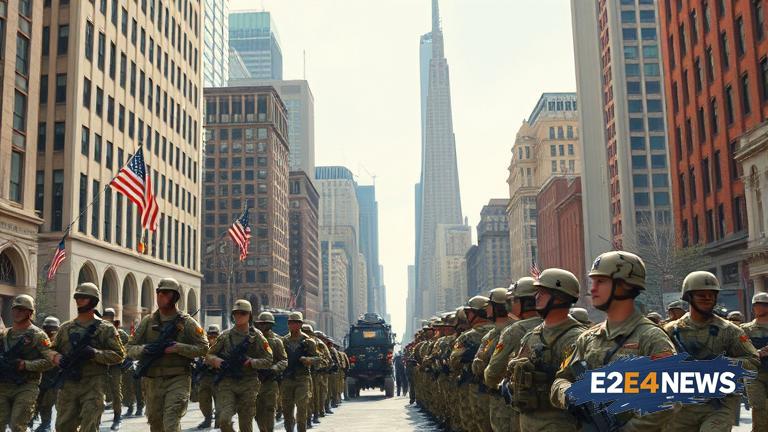The possibility of preemptive lawsuits being filed against the deployment of National Guard troops in Chicago has sparked intense debate and discussion among local residents, officials, and legal experts. The city has been grappling with rising crime rates, and the potential deployment of National Guard troops has been proposed as a measure to help mitigate the issue. However, many are concerned about the potential consequences of such a deployment, including the impact on civil liberties and the potential for excessive use of force. Some have argued that the deployment of National Guard troops could lead to a militarization of the city’s streets, which could have a chilling effect on free speech and assembly. Others have raised concerns about the potential for racial profiling and discrimination, given the city’s history of tense relationships between law enforcement and minority communities. Despite these concerns, some officials have argued that the deployment of National Guard troops is necessary to address the city’s rising crime rates, which have included a surge in violent crimes such as homicides and shootings. The city has seen a significant increase in crime over the past year, with many blaming the rise in violence on a combination of factors, including poverty, lack of opportunities, and easy access to firearms. The potential deployment of National Guard troops has been met with resistance from some community groups, who argue that the move would be a misguided attempt to address the root causes of crime. Instead, they argue that the city should focus on investing in community-based programs and initiatives that address the underlying social and economic issues that contribute to crime. The American Civil Liberties Union (ACLU) has also weighed in on the issue, expressing concerns about the potential impact on civil liberties and the potential for abuse of power. The organization has argued that the deployment of National Guard troops would be a drastic and unnecessary measure that could have far-reaching consequences for the city’s residents. As the debate over the potential deployment of National Guard troops continues, many are watching to see how the situation will unfold. The city’s mayor has stated that the deployment of National Guard troops is not a done deal, and that the city is exploring all options to address the rising crime rates. However, some officials have indicated that the deployment of National Guard troops is a possibility, and that the city is preparing for all eventualities. The potential for preemptive lawsuits has added an extra layer of complexity to the situation, with many wondering what the consequences would be if such lawsuits were to be filed. Some have argued that the lawsuits could be a necessary check on the city’s power, and would help to ensure that the rights of residents are protected. Others have argued that the lawsuits would be a frivolous attempt to undermine the city’s efforts to address the rising crime rates. As the situation continues to unfold, one thing is clear: the potential deployment of National Guard troops in Chicago has sparked a heated and contentious debate that shows no signs of abating. The city’s residents are watching with bated breath as the situation develops, and many are waiting to see what the ultimate outcome will be. The potential for preemptive lawsuits has added an extra layer of uncertainty to the situation, and it remains to be seen how the city will navigate this complex and contentious issue. In the meantime, the city’s officials are under pressure to find a solution to the rising crime rates, and the potential deployment of National Guard troops remains a contentious and divisive issue. The city’s history of racial tension and police brutality has made the situation even more complex, with many wondering what the consequences would be if National Guard troops were to be deployed. The potential for violence and unrest is a major concern, and many are hoping that the city can find a way to address the rising crime rates without resorting to the deployment of National Guard troops. The situation is a complex and multifaceted one, with many different factors at play. The city’s officials are facing a difficult decision, and the potential consequences of their actions will be far-reaching. The potential for preemptive lawsuits has added an extra layer of complexity to the situation, and it remains to be seen how the city will navigate this contentious issue. The city’s residents are waiting with bated breath to see what the ultimate outcome will be, and many are hoping that the city can find a way to address the rising crime rates without resorting to the deployment of National Guard troops.
